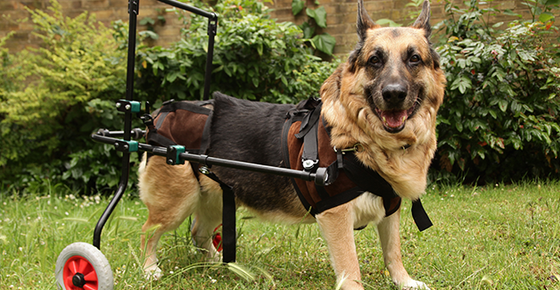
It's hard to see your pet in pain day after day, particularly if your formerly energetic friend has now become lethargic and withdrawn due to a health condition or disease. Unfortunately, pets suffer from chronic pain just like people do. Learning about types of chronic pain and treatments can help you keep your pet more comfortable.
Causes of Chronic Pain
Although chronic pain most often affects older pets, it can occur at any age. A variety of conditions and diseases can cause chronic pain, including:
- Arthritis, particularly if your pet has entered its senior years
- Cancer
- Degenerative spinal diseases
- Hip dysplasia
- Inflammatory joint disease, such as Lyme disease and rheumatoid arthritis
How Your Pet's Veterinarian Can Help
If you notice a change in your pet's behavior or condition, a visit to the veterinarian is a good idea. Your pet's doctor will perform a complete examination and may recommend one or more tests, such as X-rays or blood tests, to determine the source of your furry friend's pain. Based on the results of the examination and tests, the veterinarian will recommend a course of treatment, which may include prescription medications, physical therapy or surgery. Several types of prescription medications can be helpful if your pet suffers from chronic pain, including:
- Non-steroidal anti-inflammatory medications
- Steroids
- Opioids, including fentanyl and morphine
- Chemotherapy drugs
- Antidepressants (These drugs not only treat depression, but can also reduce pain)
- Lidocaine and other local anesthetics
- Gabapentin, a seizure medication that is also helpful in treating nerve pain
Although many of the same drugs that help you feel better can also help animals, do not give your pet any medication without checking with a veterinarian first. Some medications that are safe for humans are toxic when taken by animals.
How You Can Help
After diagnosing your pet, his or her veterinarian will recommend things you can do to make your pet more comfortable. These may include:
- Helping your pet lose weight. Extra pounds can stress the joints and make the symptoms of arthritis, hip dysplasia or other joint conditions worse. Your pet's veterinarian can provide suggestions about feeding amounts and special foods that can make losing weight easier.
- Making exercise a priority. Exercise will not only help your pet lose weight but can also reduce pain caused by arthritis. Low-impact exercises, such as walking and swimming, are best. Exercise strengthens the joints and the muscles that help support the joints.
- Adding a massage to your pet's daily schedule. Massage is very effective in easing joint stiffness and improving range of motion.
- Focusing on comfort. It can be difficult for pets suffering from joint problems, cancer or other painful conditions to jump or walk. Make their lives easier by accommodating their disabilities. If your pet normally sleeps with you but can longer jump on the bed, buy or build steps or a ramp to allow him or her to continue to spend time with you. Pet beds provide a comfortable resting place during the day or night and help your pet avoid cold floors, which can make joint pain worse. If your cat has a joint disease, it may be difficult to reach the litter box in time. Place a litter box on every level of your home to avoid accidents.
Are you worried that your pet may be in pain? Call us today to schedule an appointment for your furry friend.
